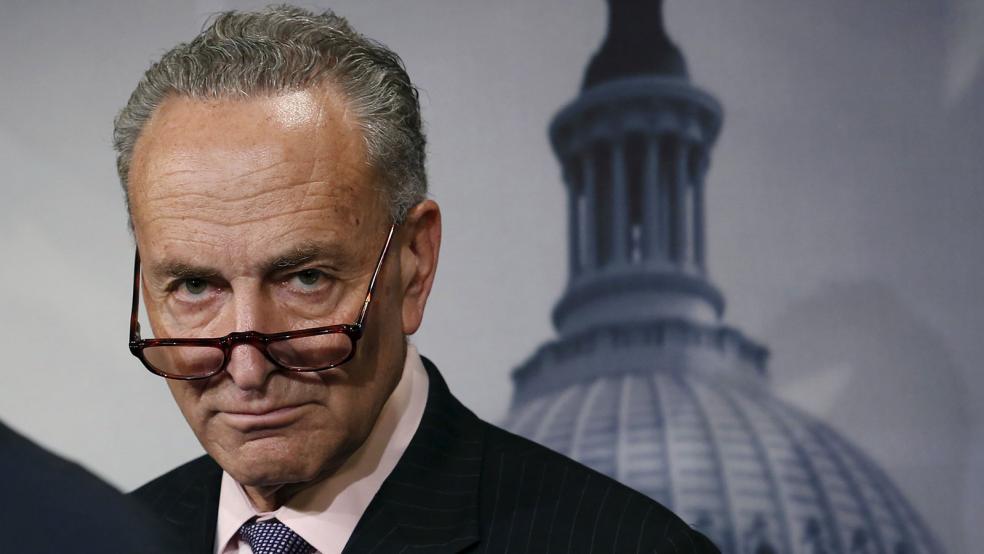Under the incoming Donald Trump administration, nominations to the Supreme Court could wind up being even more of a political flashpoint than they have been in recent years, as Senate Minority Leader Chuck Schumer on Tuesday night said that he would “absolutely” do his best to keep the current vacancy on the court unfilled.
The comments came after the New York senator had previously suggested that Democrats would be willing to support a Trump nominee if he or she were “mainstream.” In an interview with the Associated Press on Wednesday, he clarified that he doesn’t expect that condition to be met.
Related: GOP House, Off to a Shaky Start, Backtracks on Killing Ethics Panel
“My worry is, with the hard right running the show, that the likelihood of the nominee being mainstream is decreasing every day,” he said.
Senate Majority Leader Mitch McConnell on Wednesday reacted with indignation to the idea of an indefinite delay on filling the seat left vacant by the death of Justice Antonin Scalia early last year.
“That is something the American people will not tolerate,” he said in a Capitol Hill press conference, “and we’ll be looking forward to receiving a Supreme Court nomination and moving forward on it.”
The irony of McConnell criticizing an extended hold on filling a Supreme Court slot was lost on nobody. The Kentucky Republican was the chief architect of a successful plan to prevent President Obama from filling Scalia’s seat over the final year of his presidency.
Related: Senate Dems Plan to Slam the Brakes on Trump’s Cabinet
To do so, McConnell relied on a comment that Vice President Biden made in 1992 about perhaps not filling a non-existent vacancy during the final months of President George H.W. Bush’s term. McConnell and his colleagues inflated the comment into the “Biden Rule” and pretended that it had been the actual policy of the Democratic Party in order to justify blocking the nomination of an appointee, Federal Judge Merrick Garland, who members of both parties had said was eminently qualified.
In criticizing Schumer’s suggestion that Democrats could hold the Scalia seat open during Trump’s term, McConnell also failed to note that just days before the presidential election, members of his own party were suggesting that if Democratic nominee Hillary Clinton were to win, they would do exactly that.
“There is certainly long historical precedent for a Supreme Court with fewer justices,” said Texas Sen. Ted Cruz, discussing the prospect of refusing to seat Clinton’s Supreme Court nominees. “I would note, just recently, that Justice [Stephen] Breyer observed that the vacancy is not impacting the ability of the court to do its job. That’s a debate that we are going to have.”
At around the same time, North Carolina Sen. Richard Burr reportedly said in a private gathering, “[I]f Hillary Clinton becomes president, I am going to do everything I can do to make sure four years from now, we still got an opening on the Supreme Court.”
Related: Why Trump Needs to Take the Economy More Seriously
Whether or not Schumer will follow through with a threat to block a Trump nominee is unclear. The Democrats are facing a tough slate of senate elections in 2018, with several incumbents running in states that Trump won in the presidential election. Convincing enough Democrats to uphold an indefinite filibuster of a Trump nominee could be too heavy a lift.
And even if Democrats are able to hold the line, they have already provided Republicans with a roadmap for getting around it. When former Senate Majority Leader Harry Reid invoked the “nuclear option” in 2014, doing away with the filibuster for presidential nominees other than Supreme Court justices, the decision to leave the high court out of it was optional. McConnell could easily invoke the same process to eliminate Supreme Court nominee filibusters.
Democrats could take their revenge by adopting McConnell’s strategy of total opposition to all Republican legislation, which he employed to great effect while serving as senate minority leader. The result would be either total gridlock in the legislative branch, or further expansion of the nuclear option to cover legislation as well as nomination, eliminating the minority party from lawmaking entirely.
In either case, the only sure outcome would be that public approval of Congress, already at historic lows, would continue its seemingly inevitable slide toward zero.





